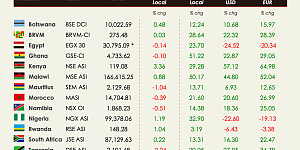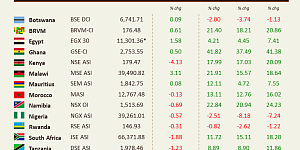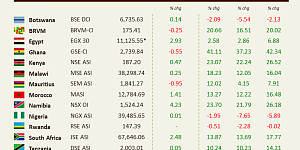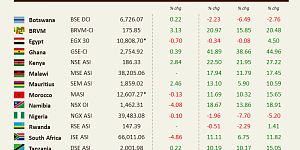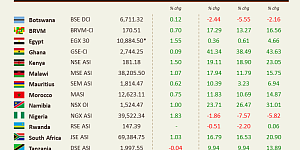September means returning from summer holidays but this year it is also a key month for global markets. One can expect volatility to shoot higher as we have quite a number of key events over this month. The Fed, Bank of Japan and European Central Bank will all hold policy meetings in September. One of the overhang for African markets remain the timing of the US rate hike. This will potentially take some air out of a rally in equities and bonds of African markets. Friday’s US jobs data came in lower than consensus expectations reducing prospects that the Fed would move quickly to increase interest rates, propping up demand for riskier assets. The US bond market is however discounting a rate hike before the end of the year with 10-year US Treasury yields on course for their biggest monthly rise in over a year. Markets were pricing in a 24% chance of a rate increase next month, and a more than a 50% chance of higher rates by the end of the year. The small miss means uncertainty will probably remain as to what will happen at the Federal Funds rate in September.
Consequently, NGSE ASI gained 1.11% despite negative news. Nigeria slipped into recession for the first time in more than 20 years with the naira trading at a record low of 420 per dollar on the black market as currency shortages continue. The drop in oil price accelerated recession and the Finance Minister announced this week that the government approved a three-year plan to borrow more from abroad. The country wants to reach a level where 40% of loans would be externally sourced and extend its debt maturity profile. The plan is to borrow $10 billion from debt markets, with about half of that coming from abroad. It is also looking for advisers to manage a $1-billion Eurobond it expects to offer this year.
JSE ASI ended the week flat. The market is still worried Finance Minister could be replaced following current fight between Pravin Gordhan and the Hawks. On top of that, there is a downside trends as investors wait to get more information as for the direction of US interest rates. Investors were also nervous about a warning that iron ore prices face renewed pressure and may sink back below $50 per tonne before year-end, as rising supply offsets an improvement in Chinese demand.
In Egypt, selling activities by retail investors caused the EGX30 to remain to remain more or less flat at 0.06% this week.
NSE ASI lost 0.67% this week. Bank stocks appeared to have bottomed out after days of decline with nearly all players rising Wednesday amidst rising orders. Share prices of Housing Finance, Coop and I&M rose by the highest allowable margin of 10% for a single day but those of StanChart and National Bank of Kenya remained unchanged.





